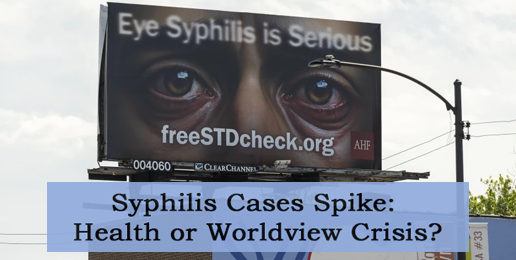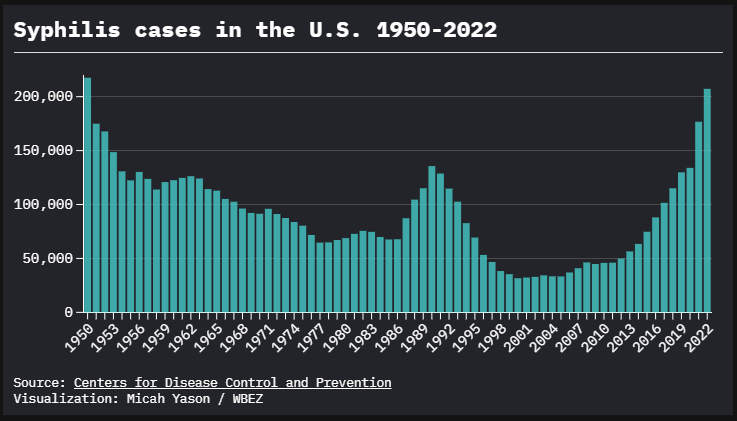
Officials at the Cook County Department of Public Health are sounding the alarm about a spike in syphilis cases, particularly congenital syphilis, in which this malady is passed to a preborn baby.
The rise in this sexually transmitted infection (STI) is not just a regional problem but rather a nationwide one. Earlier this year, the U.S. Department of Health and Human Services warned that cases of syphilis in the U.S. are at a 70-year high. Apparently, the comprehensive sex ed taught to young children in most public schools is failing miserably since proponents promised it would reduce STIs.
The immoral sex ed being taught to millions of children in public schools includes affirming the LGBTQ+ lifestyle. In Illinois, history classes also teach affirmation of the roles and accomplishments of so-called sexual minorities. In fact, the law requires students to be proficient in this biased “history” to receive an eighth-grade diploma. It’s no wonder STIs are increasing. Children and young adults are experimenting with dangerous sexual behaviors as a direct result of what they have been taught.
According to the most recent STI report by the CDC, there has been an 80 percent jump in the number of syphilis cases between 2018 and 2022. Its spread has been termed a “slow surging epidemic.”

While the majority of recent cases are among gay, bisexual, and other men who have sex with men (MSM), it is a disease that can affect anyone who engages in promiscuous activity. As I said, public school sex-ed and history courses affirm LGBTQ+ lifestyles. Is it any wonder that curious young teens and adults are putting what they learn into practice?
Though less common, syphilis can also spread through blood transfusions, the sharing of needles, and direct, non-sexual contact with a syphilis sore. According to Webmd.com,
“syphilis causes sores, rashes, and other symptoms. If left untreated, it can cause serious long-term problems that affect the brain, eyes, heart, and other organs.”
According to this site, if left untreated, “syphilis can cause serious health problems and death.”
For pregnant women, syphilis can cause miscarriages, premature birth, and stillbirth. Babies also have a high chance of contracting syphilis in the womb. The disease can cause infant death, organ damage, fetal anemia, heart failure, seizures, damaged vision and hearing, and long-term health and developmental complications for surviving babies.
This alarming trend has triggered a response from local, state, and federal health officials, who are sounding the alarm in hopes of curbing the spread of this preventable disease.
Even the AIDS Healthcare Foundation has been sounding the alarm with a billboard stating, “Eye syphilis is serious,” with a close-up of bloodshot eyes.
The top story on the Cook County Department of Health’s website highlights this concern with the title, “Syphilis Stops with Me.” Unfortunately, the link to “How to Reduce Your Risk of Getting Syphilis Before and During Your Pregnancy” is at the bottom of the page. You would think that this risk avoidance message would be front and center.
Yet, at least they are being honest about the absolute best solution for STIs:
The only way to completely avoid sexually transmitted infections, including syphilis, is not to have vaginal, anal, or oral sex.
This page also includes three bullet points recommending monogamy, the use of condoms (which can be ineffective), and syphilis testing. Of course, the latter two assume non-monogamous behavior.
Earlier this week, WBEZ’s Sasha-Ann Simons aired an interview about this epidemic with Dr. Kimberly Stanford, associate professor of medicine at the University of Chicago. When asked about why we are seeing this spike in syphilis cases, Dr. Stanford honestly responded, “I think there are social trends that play into a lot of this.” She goes on to explain:
…then there came more sexual freedom, birth control pills, all of those things that came in the ’70s and ’80s. And so, we started seeing people being less careful about their sexual practices.
And then along came HIV. And when HIV came, at first, people were scared. And so all of a sudden, now, people were being more careful again. And when you’re more careful, not only do you prevent HIV transmission, but you prevent transmission of all the other STIs, including syphilis. So then we saw that decrease again.
And then, HIV became a treatable disease, and we started having HIV pre-exposure prophylaxis or prep. So, prevention for HIV… So then started, and at the same time, syphilis numbers had gotten so low that I think public health, to some extent, let our guard down.
Her points about sexual freedom, birth control, and sexual practices should not be overlooked. Syphilis, like all STIs, is connected to risky sexual behavior and foolish choices. Let’s use the politically incorrect phrase: sinful sexual behavior. But Dr. Stanford doesn’t lay the blame there; she states that, in her opinion, government officials dropped the ball:
We stopped doing those campaigns for publicity. We stopped making sure everybody was getting screened because the numbers had gotten low. And so our priorities and our funding moved elsewhere. And so then it started to creep up on us over the last 20 years as people have been less concerned about the safe sex practices, knowing that HIV wasn’t as big of a concern, that it could be treated and prevented so well. And at the same time, we have less resources going towards syphilis because it had largely disappeared…
Screening for STIs and promoting so-called “safe sex” is an inadequate way to deal with the spread of syphilis. It does nothing to address the root cause but only mitigates the consequences of promiscuity.
Of course, there is a political side to this public health concern. The secular worldview, as articulated by Dr. Standford in this interview, is that syphilis “can affect anyone” but that it is specifically “affecting people who have limited access to care.” She goes on to say:
So, people who are traditionally marginalized, people who are underinsured, who may not be accessing routine primary care for their annual visits. And what that means, too, is racial and ethnic minorities. We’ve traditionally thought of syphilis as an infection that it more affects men, and so women have been under-screened, and now we’re seeing a huge increase among women.
And so I think what we really need to start thinking about is how do we reach these populations that really, they’re disproportionately affected by many conditions because they have difficulty accessing care.
In response, host Sasha-Ann Simons points out that
In Chicago, Black residents bear a disproportionate share of the burden, representing 86% of congenital syphilis cases that were diagnosed between 2020 and 2022. So, to your point, yes, affecting racial and ethnic minorities the most right now.
Sexually transmitted infections do not care about one’s socioeconomic conditions or ethnicity. If we agree that abstinence and monogamy are the unassailable solutions, why promote secondary, less effective measures? Are we that foolish and proud to ignore this standard because it is biblical, traditional and/or conservative?
When asked about the solutions to this problem, Dr. Stanford responds:
I think public health funding, which is now coming, we’re now seeing more and more of that for campaigns, for awareness, for testing, for screening for folks, really making sure that healthcare personnel know that this is a problem because there’s still an issue with even people in the healthcare field not realizing syphilis has made this resurgence.
So, educating people that they need to be testing their patients. And educating consumers, educating communities that they need to make sure that they are seeking out this testing, that they are using safe sex practices to prevent it in the first place. And that means condoms every time.
Throwing more tax dollars at the problem is not the answer. STI screenings are not the answer. “Safe sex” messaging is not the answer.
Following God’s design for sex, marriage, and family is the answer.
Dr. Stanford goes on to warn that
“congenital syphilis, which is the syphilis that is transmitted to babies from mothers, is 100 percent preventable. The earlier you treat it, the better the outcomes are.”
The secular worldview solution is, in many ways, nonsensical. One “solution” favors STI testing after the would-be victim engages in risky sexual behavior. All this does is determine whether the infection has been acquired. It does nothing to reduce (or eliminate) the risks.
Since cases of syphilis are on the rise in Chicago and across the United States, you would think health and public policy officials would be jumping up and down, loudly emphasizing the tried-and-true antidote to promiscuity:
Abstinence before marriage and monogamy after marriage.
But they are not interested in addressing the root of the problem: sinful choices.
The most effective remedy to this outbreak, and every social ill facing society, can be found by acknowledging and following God’s model for life. Building and holding fast to a biblical worldview will equip us to identify the lies of our culture. We would be wise to make this a priority personally, in our homes, and with our children.
Romans 12:2 urges us not to follow the world’s “pattern” (i.e., worldview) and to instead be transformed by the renewing of our minds. Scripture also warns us repeatedly “not to be deceived” in 1 Corinthians 6:9 and 15:33 and James 1:16.
The only way we can thwart deception – or identify a corrupt worldview – is by knowing God’s Truth. In our day, Christians must understand how vitally important it is to be rooted in the one place we can be confident we will find the truth – the Word of God.
Knowing God’s Word is essential to building a biblical worldview. See also Ephesians 2:1–2, Colossians 2:8, and 1 Corinthians 2:12 – all of which speak to the importance of a Christian worldview.






















